Future-Proof PMs: 5 Skills You’ll Need to Lead in 2026
Explore the top 5 future skills for project managers to prepare your career and become a standout leader in the field of project management.
As we approach 2026, the landscape for project managers (PMs) is shifting rapidly. With the rise of artificial intelligence, new technological tools, and changing business models, the future skills for project managers are becoming increasingly diverse. No longer can PMs rely solely on traditional project management techniques; they must adapt to the technological advancements and leadership demands that are reshaping the industry.
As we look to the future, successful PMs will be those who embrace continuous learning and skill development. Whether it's mastering AI for project management, refining leadership strategies, or expanding their understanding of business impact, the most effective PMs in 2026 will be those who are well-rounded, adaptable, and forward-thinking. In this blog, we'll explore the top 5 skills you’ll need to future-proof your career and become a standout leader in the ever-changing field of project management.
Why Future Skills for Project Managers Matter
As we move towards 2026, the role of project managers (PMs) is undergoing a transformation driven by technological advancements and shifting workplace dynamics. The future skills for project managers are no longer limited to traditional management techniques or technical proficiency in project management tools. They include deep knowledge of emerging technologies like artificial intelligence (AI), machine learning (ML), and data analytics, along with strong leadership capabilities, strategic thinking, and the ability to drive cross-functional collaboration.
As technology continues to evolve, PMs will need to adopt a mindset of continuous learning. The days of relying solely on tools like Gantt charts or basic project tracking software are gone. Businesses are increasingly reliant on data-driven decision-making, automation, and AI to streamline operations, enhance customer experiences, and drive growth. PMs are no longer just expected to oversee project timelines and resources; they are now tasked with integrating these new technologies into their project workflows.
As companies adopt more sophisticated technological solutions, the demand for technologically-savvy PMs who can bridge the gap between business strategy and technical execution will continue to grow. Project managers will need to play a pivotal role in helping organizations leverage these advancements to drive efficiency, enhance innovation, and maintain competitive advantage.
Skill #1 - Embrace AI and Technology for Efficiency
Today, artificial intelligence (AI) and machine learning (ML) are becoming essential tools for project managers (PMs). These technologies not only streamline operations but also help PMs make more informed decisions and improve project outcomes. AI for Project Management is revolutionizing how PMs handle idea validation, user research, backlog grooming, and analytics.
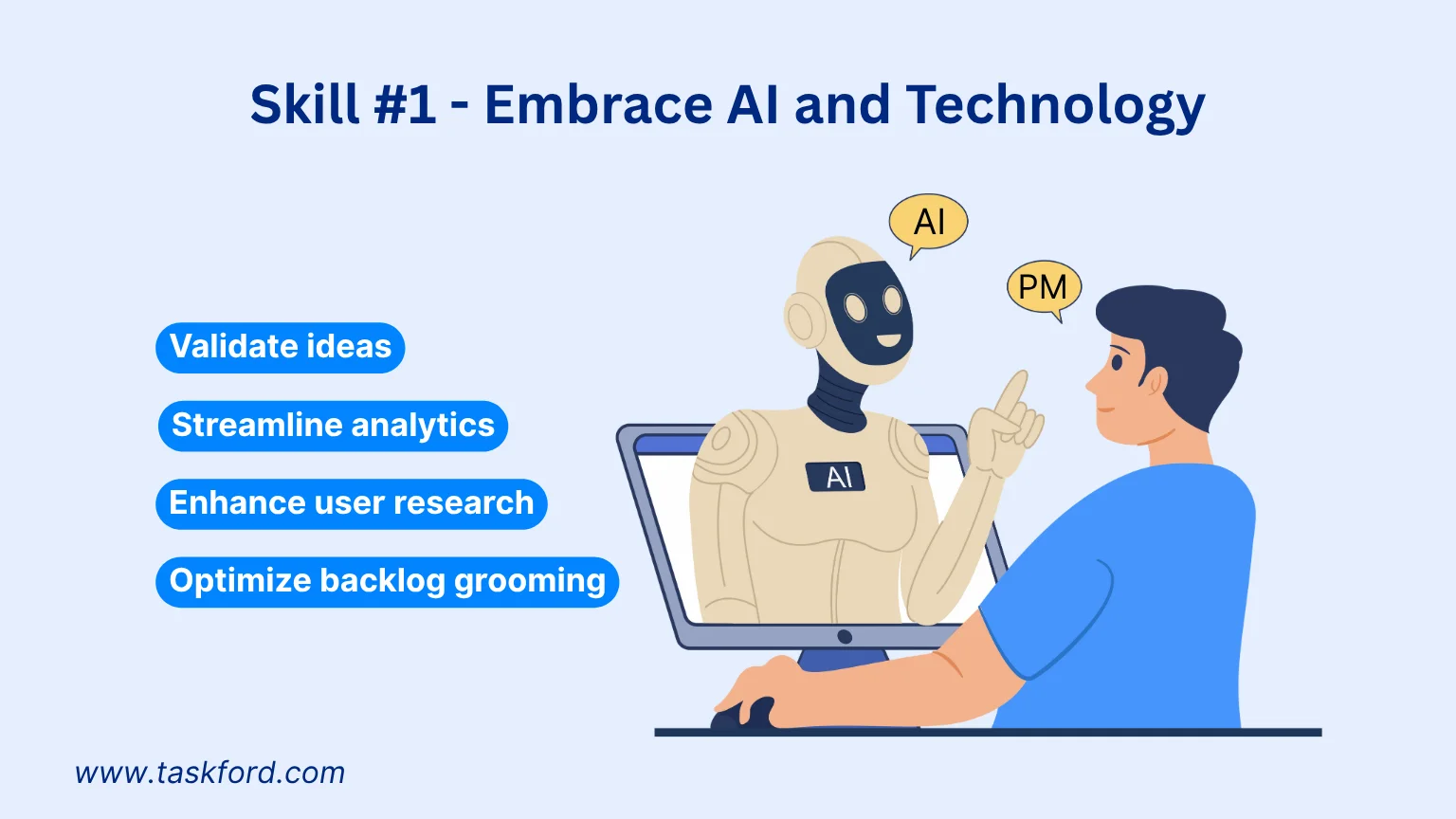
How AI Can Improve Project Management Efficiency
PMs can leverage AI tools to:
- Validate ideas: Use AI to test product concepts or features by analyzing user feedback and behavior data, ensuring only the most viable ideas are pursued.
- Enhance user research: AI can assist in analyzing large datasets from user surveys or feedback, providing insights faster and more accurately than manual methods.
- Optimize backlog grooming: AI tools can help prioritize tasks based on project needs and team capacity, reducing the time spent on organizing project backlogs.
- Streamline analytics: Automated AI-driven analytics can track project progress, identify risks, and suggest optimizations in real time.
Essential Technical Tools for PMs
PMs looking to stay competitive should also consider learning technical tools such as:
- Python for automating tasks and data analysis.
- SQL for managing and querying databases.
- Cloud technologies like AWS or Microsoft Azure to manage remote teams and enhance scalability.
Skill #2 - Build Strong Strategic Leadership and Storytelling Abilities
As businesses grow and projects become more complex, PMs must shift from a tactical mindset to one that focuses on strategic leadership. In the future, PMs will be expected to lead teams by aligning project goals with the broader vision of the company, and storytelling will play a critical role in this process.
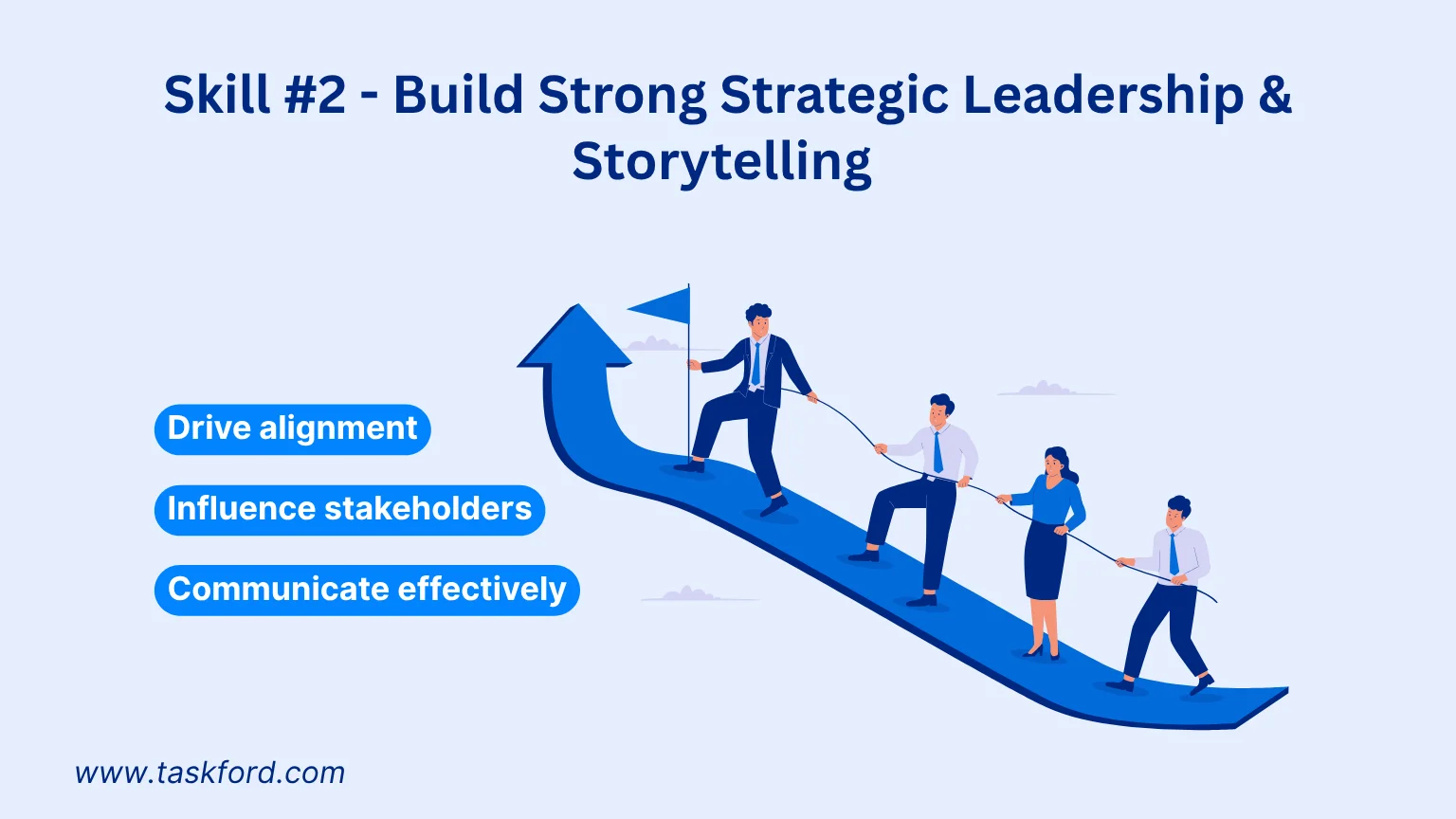
Why Strategic Leadership is Crucial for PMs
PMs need to take on a strategic leadership role by thinking beyond project execution. They must define how their projects contribute to the company's larger business objectives and communicate that value effectively to stakeholders.
The Power of Storytelling in Project Management
Storytelling allows PMs to:
- Drive alignment: Use storytelling to present project roadmaps and objectives in a way that resonates with all stakeholders, ensuring everyone is on the same page.
- Influence stakeholders: A compelling narrative helps PMs secure buy-in and maintain support for projects, even when challenges arise.
- Communicate effectively: Storytelling aids in simplifying complex ideas, making it easier for teams and executives to understand the project’s impact and importance.
Skill #3 - Quantify Business Impact and Strengthen Commercial Awareness
In the future, PMs must be able to quantify the business impact of their projects to demonstrate value and secure buy-in from stakeholders. This requires a strong understanding of commercial awareness, business strategy, and financial literacy.
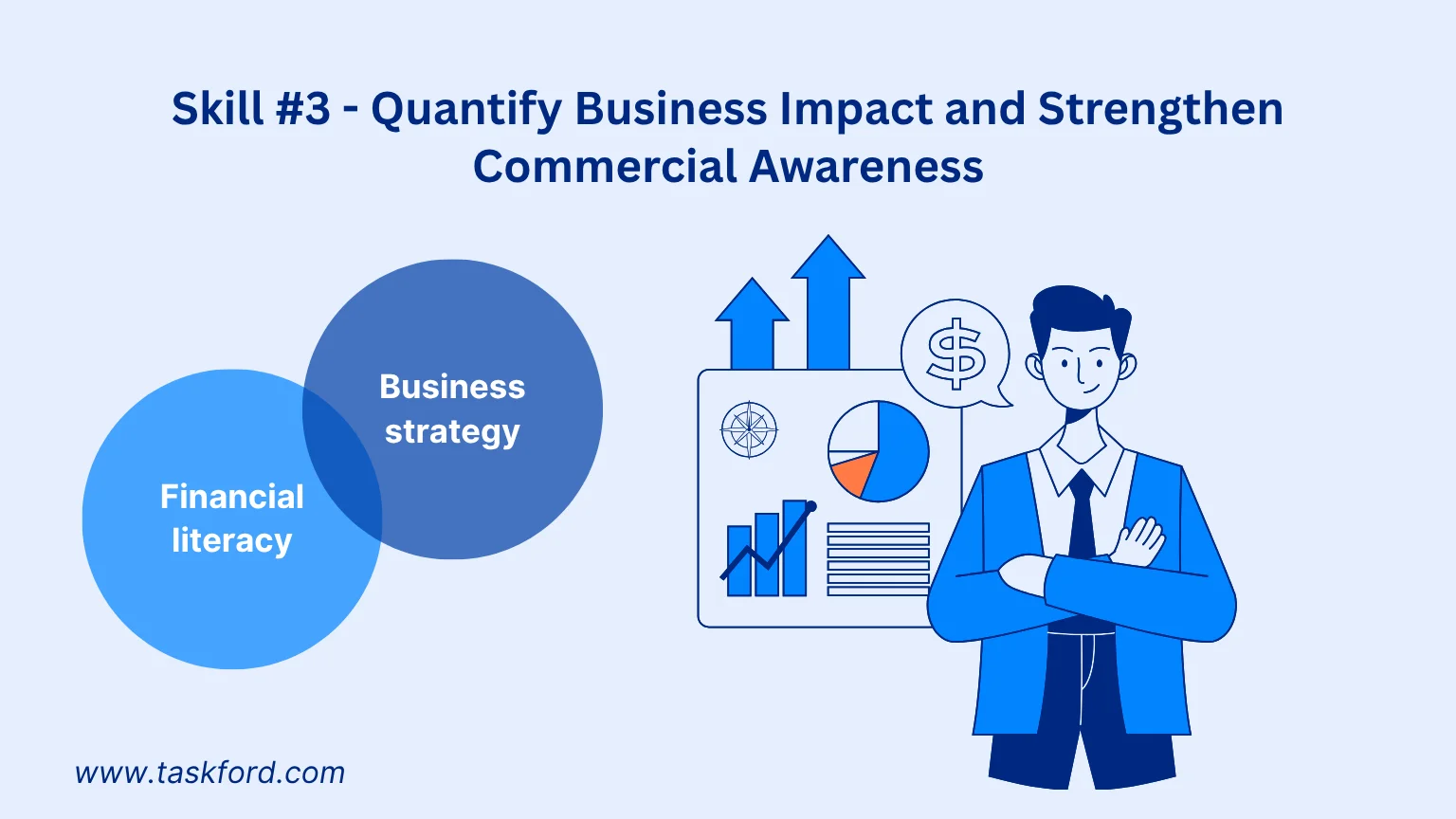
Why Business Impact Matters
PMs are no longer just executing projects; they must show how projects contribute to the company's bottom line. This means understanding how their work affects overall business goals, such as revenue generation, customer satisfaction, and market share. PMs should be able to link project outcomes to tangible business metrics to prove their projects' worth.
Tools to Assess and Communicate ROI
PMs can use frameworks like ROI (Return on Investment) or NVP (Net Present Value) to measure and communicate project value. For example:
- Financial literacy: Understanding how to read profit and loss statements or balance sheets helps PMs communicate how their projects align with financial objectives.
- Business strategy: Aligning project goals with broader strategic initiatives, such as market expansion or cost reduction, strengthens a PM’s ability to lead successfully.
Skill #4 - Master Cross-Functional Collaboration
PMs will need to work more effectively with diverse, cross-functional teams. Cross-functional collaboration will be essential for PMs to successfully deliver projects, as they must collaborate with departments such as sales, marketing, and finance.
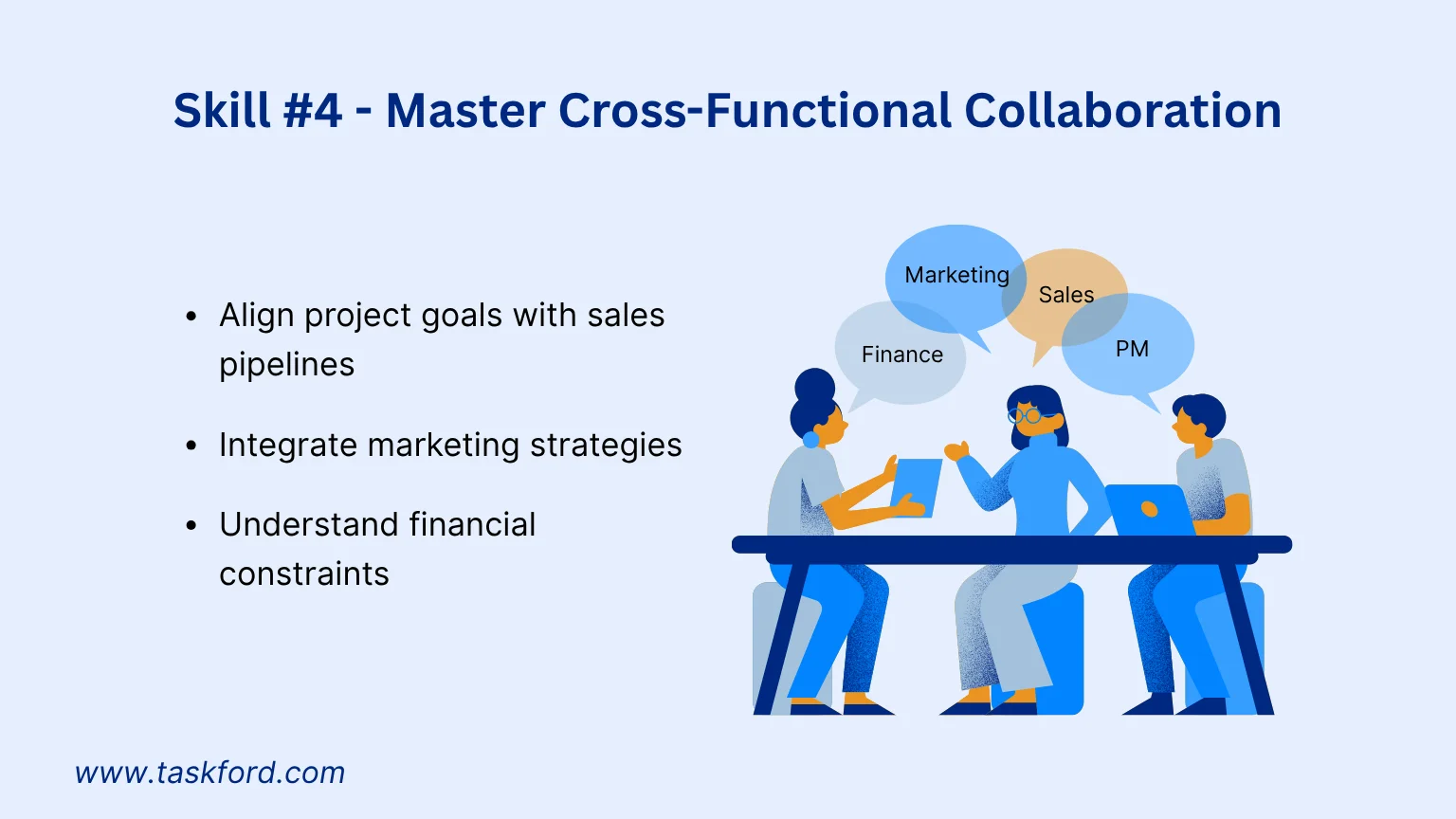
The Importance of Cross-Functional Skills
PMs who understand the interplay between various business functions will be better equipped to:
- Align project goals with sales pipelines, ensuring the product meets customer demand.
- Integrate marketing strategies, making sure projects support product launches and brand positioning.
- Understand financial constraints and adjust project budgets to align with broader business priorities.
Expanding Knowledge Across Functions
Networking and learning from other PMs across industries is essential. Expanding knowledge in adjacent areas, like finance or marketing, will give PMs the insight they need to manage projects effectively and align with organizational goals.
Skill #5 - Stay Hands-On with Technology Without Losing Focus on Big-Picture Strategy
While staying hands-on with the latest technologies is important, PMs must also retain a focus on big-picture strategy. Balancing technical proficiency with strategic vision is one of the most essential skills for PMs.
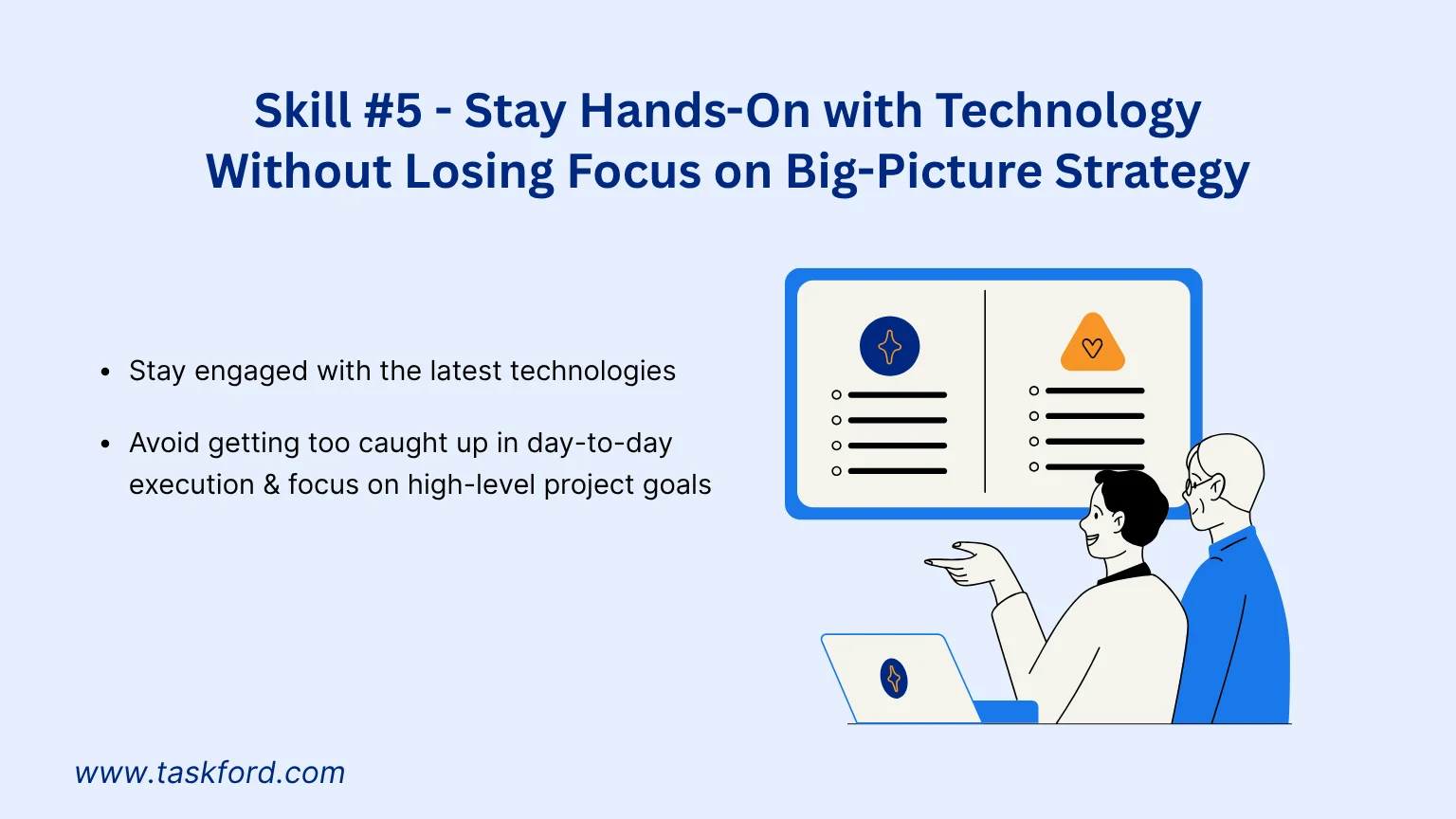
How to Balance Technology and Strategy
PMs must:
- Stay engaged with the latest technologies like AI, APIs, and cloud systems to remain credible with technical teams.
- Avoid getting too caught up in day-to-day execution and focus on high-level project goals, such as customer experience and long-term business impact.
Understanding Technical Feasibility
PMs should develop a solid understanding of technical feasibility to communicate effectively with developers and ensure that projects are aligned with what is technically possible. However, they should also keep the broader strategic goals in mind to ensure that their projects contribute to the company’s success.
The Long-Term Benefits: Career Growth and Impact
Investing in future skills for project managers yields lasting rewards beyond immediate job prospects.
- Career Progression: PMs who balance technical depth with strategic breadth (e.g., rotating through diverse projects) position themselves for senior roles. Networking with peers reveals the variability of PM roles, helping you tailor skills to specific industries like adtech or cloud-native solutions.
- Personal Fulfillment: Upskilling through mentoring, side projects, or AI-assisted learning keeps PMs engaged and innovative. Avoiding tactical traps allows more time for high-level strategy and customer interactions, leading to more meaningful work.
- Organizational Value: Skilled PMs drive better products, reduce risks, and boost team velocity. As one veteran PM shared, "The biggest gap is telling a clear story—master it, and you'll lead teams to success."
In essence, these skills ensure PMs not only survive but thrive, contributing to resilient organizations in an uncertain future.
Final Thoughts
Future skills for project managers matter because they equip you to navigate AI disruptions, bridge skill gaps, and seize opportunities in the future job market. From technical proficiency to strategic leadership, these competencies are the foundation for long-term career growth and impactful leadership. Don't wait for the next layoff or market shift—start upskilling today with courses, networking, or AI tools.
Making work simpler,
smarter, and more connected
Join our waitlist and be notified first.

Related Blog
Subscribe for Expert Tips
Unlock expert insights and stay ahead with TaskFord. Sign up now to receive valuable tips, strategies, and updates directly in your inbox.





